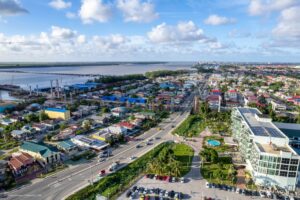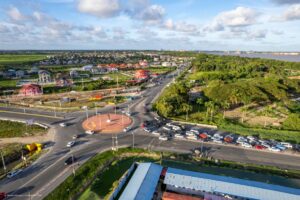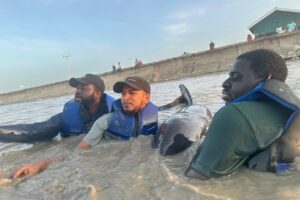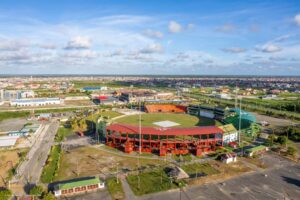The University of Guyana is the lone higher education institution Guyana has ever produced. It offers numerous amount of programs in varying schools and faculties to both local and International students. These programs are made possible at two campuses namely ‘Turkeyen’ and ‘Tain’ campus. To date the University of Guyana has approximately 8,601 students, 129 exciting programs and 1,061 staff.
The Administration
- Vice-Chancellor
- Deputy Vice-Chancellor (AE)
- Deputy Vice-Chancellor (PIE)
- Deputy Vice-Chancellor (PACE)
- Registrar
- Bursar
- Director Berbice Campus
- Director of Strategic Initiatives
- Director of Undergraduate Research
- Statutory Officers
Administrative Divisions
- Bursary
- Facilities & Maintenance
- International Engagement
- Library
- Personnel Division
- Planning
- Public Relations Division
- Registry
- Admissions Division
- Committees
- Examinations Division
- Records and Data Management Division
- Students’ Welfare Division
- Safety & Security
Mission Statement
“To discover, generate, disseminate, and apply knowledge of the highest standard for the service of the community, the nation, and of all mankind within an atmosphere of academic freedom that allows for free and critical enquiry.”
Origin of the University
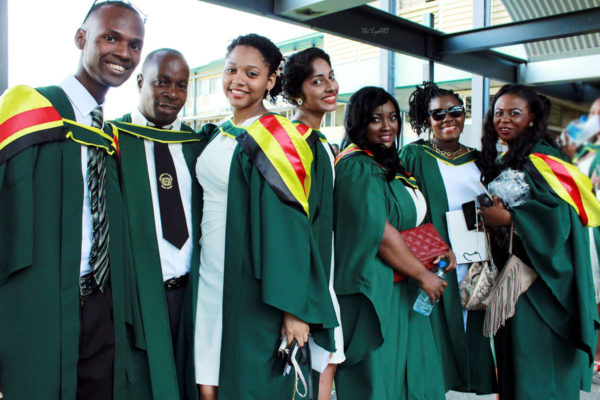
Students | Image Source: https://www.uog.edu.gy/
The University of Guyana was established in April 1963 and began its operations on October 1 of the same year at Queens College compound, the nation’s premier secondary school. This was prior to moving to the Turkeyen Campus in 1970.
In the beginning, programmes were confined to the Arts, Natural Sciences, and Social Sciences. Later on a Faculty of Education was created in 1967, and this was followed by the Faculty of Technology in 1969 (now Faculty of Engineering and Technology), the Faculty of Agriculture (1977). Thereafter they included the Faculty of Health Sciences (1981), which was an outgrowth of Natural Sciences. Further, the Institute for Adult and Continuing Education began as an extra-mural arm, in 1976. In 1996 the Institute was renamed the Institute of Distance and Continuing Education (IDCE).
Moreover, a Forestry Unit was established in 1987 and it subsequently became part of the Faculty of Agriculture and Forestry. In 2003 the Faculties of Arts and Education merged to become the School of Education and Humanities (now Faculty of Education and Humanities). Additionally, the turn of the Millennium saw the formation of the School of Earth and Environmental Sciences (SEES), born of the merger of the Geography Department and the Environmental Studies Unit. Also created were the Biodiversity Centre, which is pertinent to the activities pursued by SEES and the Faculty of Agriculture and Forestry, and a Centre for Information Technology (CIT), which serves the entire university. The University of Guyana expanded in 2000 with the addition of the Berbice Campus at Tain, Corentyne. In October 2016, as part of a broader re-organisation, SEES was transformed into the Faculty of Earth and Environmental Sciences (FEES). As the University advance the School of Entrepreneurship and Business Innovation was created in the year 2017.
Academic Activities
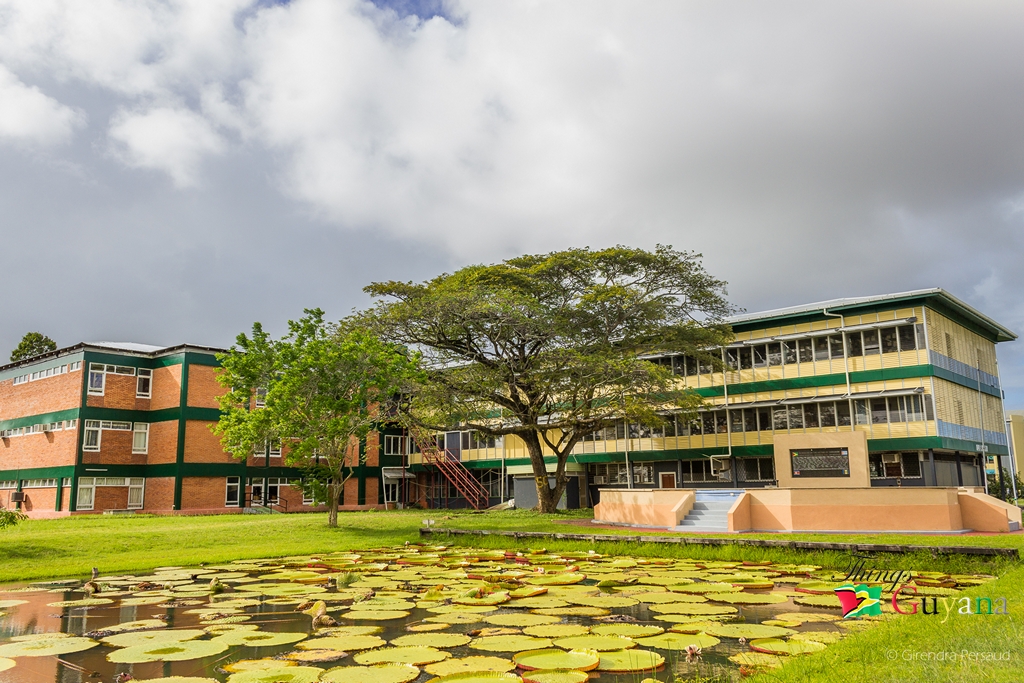
The Lilly Pond & Library (Turkeyen Campus)
The University offers certificate, diploma, associate degree, undergraduate degree, graduate (post-graduate) degree, and professional degree programmes. These programmes are delivered through seven Faculties and one School, each of which is headed by a Dean: Agriculture and Forestry; Earth and Environmental Studies; Education and Humanities; Engineering and Technology, Entrepreneurship and Business Innovation, Health Sciences, Natural Sciences; and Social Sciences.
More than 116 under-graduate and post-graduate programmes are available, including Computer Science, Engineering, Entrepreneurship, Environmental Studies, Forestry, Urban Planning and Management, Tourism Studies, Education, Creative Arts, Economics, Law, Medicine, Optometry, Supply Chain Management and Nursing.
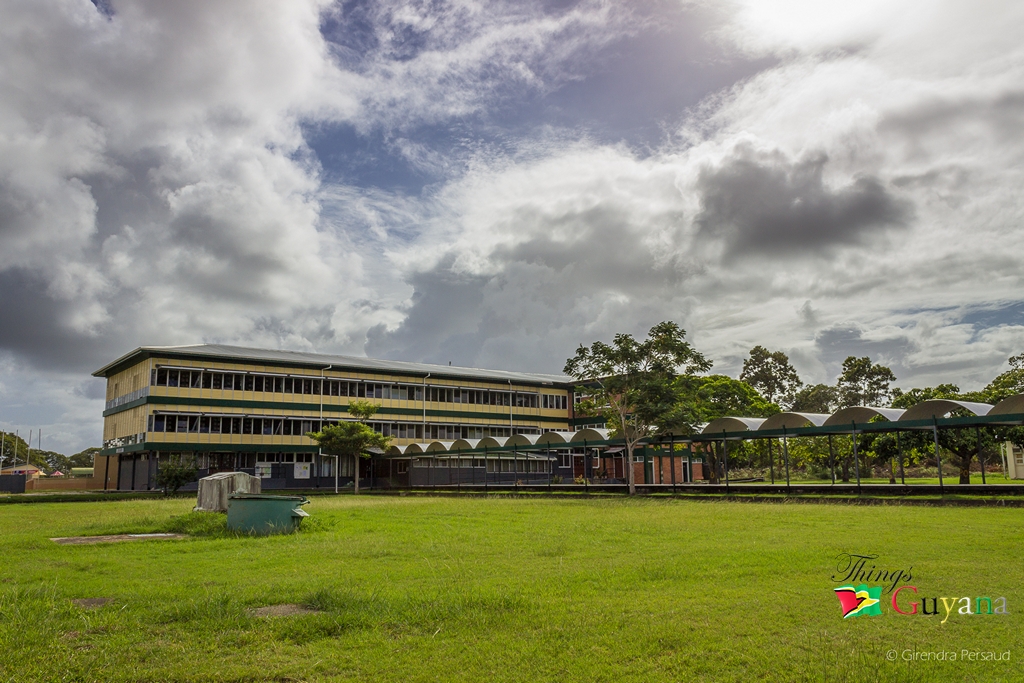
Turkeyen Campus
The largest unit is the Faculty of Social Sciences, with the following seven departments: Business and Management Studies; Centre for Communication Studies; Economics; Government and International Affairs; Graduate Studies; Law; and Sociology. The Department of Business and Management Studies, the largest unit in the Faculty of Social Sciences, offers three programmes; Accounting, Banking and Finance, and Marketing. As well, it has about 1,500 students, the single largest group in the Faculty of Social Sciences, and 15 faculties (10 full-time and 5 part-time). Moreover, it jointly manages the licensed Commonwealth of Learning Masters in Business Administration, and Public Affairs (CMBA/PA).
Extra-mural classes are available at four locations through the Institute of Distance and Continuing Education (IDCE) – in the city of Georgetown Region #4, and the towns of Anna Regina, Essequibo, Region #2; Linden, Upper Demerara, Region #10; and New Amsterdam, Berbice, Region # 6. Several online programmes are also available.
The University of Guyana also offers the opportunity for student engagement in debating, sports, and cultural, religious and professional activities.
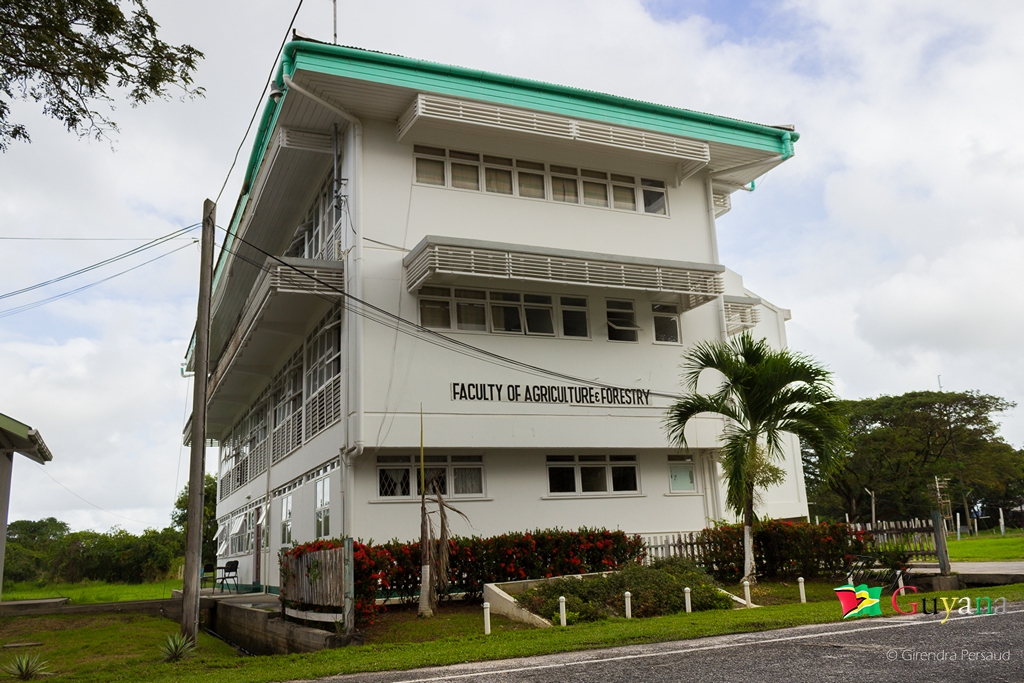
Turkeyen Campus
The institution had a 2017 enrolment of some 8,000 students, and it has graduated more than 20,000 students, who have gone on to successful careers locally, regionally and internationally in all professional fields of endeavour. The University is a major contributor to the public and private sectors and to the national economy.
Tain Campus
One of the university’s most significant undertaking was the formation of the Berbice campus. It was established with the intention of making university education more accessible to Berbicans, who previously endured the inconvenience of travelling to the Turkeyen Campus to pursue university studies.
In keeping with the spirit of development, lecturers have been instrumental in forming clubs that would promote students’ participation in extra-curricular activities.
These clubs include the Sports Club, the Environmental Club and the UGBC Cultural Club. A hard court was completed in October 2008 to facilitate students’ involvement in sports.
The University of Guyana – Berbice Campus has played an elemental role in qualifying both Guyanese and foreign students. This is with the assistance from the Turkeyen Campus, government and private organizations, alumni groups, and the Guyanese community. Moreover, UGBC will continue to fulfill its obligation to produce intellectually competent men and women who will be of service to “the community, the nation and all mankind.”
Contact Information
Turkeyen Campus
- The University of Guyana
Turkeyen Campus
Greater Georgetown
Guyana - +(592)-222-5423
+(592)-222-5122 - [email protected]
Article References
- https://www.uog.edu.gy/
- https://www.uog.edu.gy/about
- https://www.masterstudies.com/universities/Guyana/University-of-Guyana/



